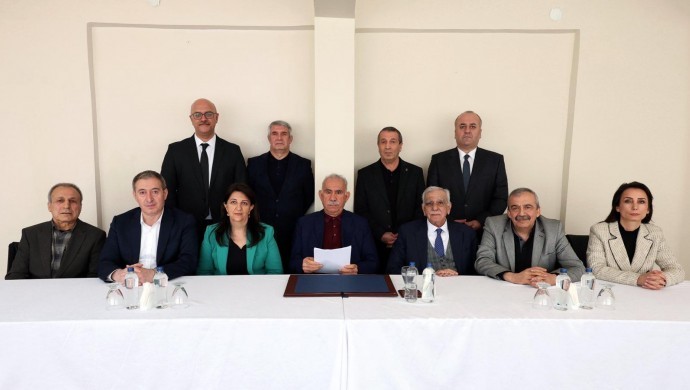Turkey’s government has cautiously welcomed the outlawed Kurdistan Workers’ Party’s (PKK) decision to lay down its arms, promising democratic and inclusive constitutional reforms, while dismissing claims that the changes could restructure Turkey’s unitary system and open the door to a more decentralized or federal system of governance, as opposition figures call for a legal framework to consolidate peace.
The PKK on Monday announced its dissolution following a congress held in northern Iraq earlier this month, formally ending a four-decade armed campaign that claimed over 40,000 lives.
The historic announcement followed an appeal by jailed PKK founder Abdullah Öcalan, who on February 27 urged his militants to disarm and disband in a letter from prison on İmralı Island in the Sea of Marmara, where he has been held since 1999.
While the ruling Justice and Development Party (AKP) responded to the PKK’s announcement with cautious optimism, officials quickly dismissed claims that efforts for constitutional reform — long advocated by President Recep Tayyip Erdoğan, who argues that the 1982 charter was the product of a military regime and failed to reflect the national will — could pave the way for a federal system of governance.
“The state’s handling of the PKK’s decision to disband and lay down arms is not based on any form of negotiation,” the Center for Combating Disinformation (DMM) under the Presidential Communications Directorate said in a statement on X, calling allegations of an upcoming federal model “disinformation.”
Silah bırakma ve örgütün fesih kararının alındığı PKK kongre bildirgesine ilişkin, “Bu karar sonrası Anayasa değişikliğiyle özerk ve federal bir yönetimin sağlanacağı” iddiası dezenformasyondur.
Terörsüz Türkiye hedefiyle terör örgütünün silah bırakma ve fesih kararına yönelik… pic.twitter.com/e36JYXwPgD
— Dezenformasyonla Mücadele Merkezi (@dmmiletisim) May 12, 2025
The center added that ongoing constitutional reform efforts on Turkey’s agenda are aimed at delivering a “civil, democratic, liberal and inclusive” charter.
The reaction followed comments by retired Brig. Gen. Naim Babüroğlu, who suggested on Sözcü TV that the post-PKK phase could steer Turkey toward “an autonomous and federal structure approved by parliament.”
Presidential adviser Mehmet Uçum, a key figure in shaping Turkey’s legal reform agenda, described the PKK’s disbandment decision as the start of a “historic period of ascent” rather than a conclusion. In a post on X he said Turkey stood on the brink of sweeping legal and democratic reforms.
TERÖRSÜZ TÜRKİYE HAYATA GEÇİYOR!
Baştan belirtelim ki; Terörsüz Türkiye hedefine ulaşarak Türkiye Yüzyılını gerçekleştirmek, Vatanın bölünmez bütünlüğü uğrunda canlarını veren aziz şehitlerimizin yüce hatıralarına bağlılığımızın bir gereği ve temel ödevimizdir.
Görünen o ki;…
— Mehmet Uçum (@mehmetucum) May 12, 2025
“A terror-free Turkey is not the conclusion, but a new beginning,” Uçum wrote, saying the shift would enshrine “national and patriotic democratic law.”
He also framed the moment as a reaffirmation of unity, calling Kurds “an inseparable component of the Turkish nation” and adding: “The Republic of Turkey is also the national state of the Kurds. The coming era is the century of both Turks and Kurds.”
Devlet Bahçeli, leader of the far-right Nationalist Movement Party (MHP) and a key ally of President Erdoğan who in a surprise move launched the peace talks in October when he unexpectedly offered Öcalan an olive branch if he would publicly renounce violence, also weighed in following the PKK’s announcement to disband itself.
“A bloody chapter written in betrayal has been closed, never to be reopened,” he said in a strongly worded written statement on Monday.
Bahçeli said the dissolution of the PKK must be followed by clear legal and strategic steps while calling for a detailed framework to define how, where and under what conditions the militant group will lay down its weapons.
Bahçeli noted that the peace process must be anchored in security and legality, warning against “cheap polemics” and “ideological obsessions” that could undermine reconciliation.
Meanwhile, the pro-Kurdish Peoples’ Equality and Democracy Party (DEM Party) welcomed the PKK’s move but said the process needs clear legal and political grounding.
“Steps must be taken to build mutual trust and create a legal framework,” said Gülistan Kılıç Koçyiğit, a deputy group chair, in remarks to Reuters.
Party officials also convened an emergency meeting of their Central Executive Board (MYK) following the PKK’s announcement. Speaking to reporters after the meeting, DEM Party Co-Chair Tuncer Bakırhan said there were no longer any excuses for avoiding a democratic solution to the Kurdish issue.
“I hope we can crown this process with peace,” he said.
The Kurdish issue, a term prevalent in Turkey’s public discourse, refers to the demand for equal rights by the country’s Kurdish population and their struggle for recognition.
Former peace negotiator and DEM Party lawmaker Pervin Buldan called the moment “an atmosphere we can now embrace with hope” and said it represented a long-awaited opportunity to move beyond failed efforts of the past.
The PKK’s declaration was the culmination of seven months of work to renew long-stalled talks that began in October when Ankara offered Öcalan an unexpected olive branch.
The PKK, designated a terrorist group by Turkey and its Western allies, has waged an insurgency against the Turkish state since 1984.
Its original aim was to carve out a homeland for the Kurds, who make up about 20 percent of Turkey’s 85 million people.
Seen as the world’s largest stateless people, Kurds were left without a country when the Ottoman Empire collapsed after World War I.
Although most live in Turkey, the Kurds are also spread across Syria, Iraq and Iran.
Turkey’s widescale use of combat drones has pushed most Kurdish militants into northern Syria and Iraq, where Ankara has continued its raids.

